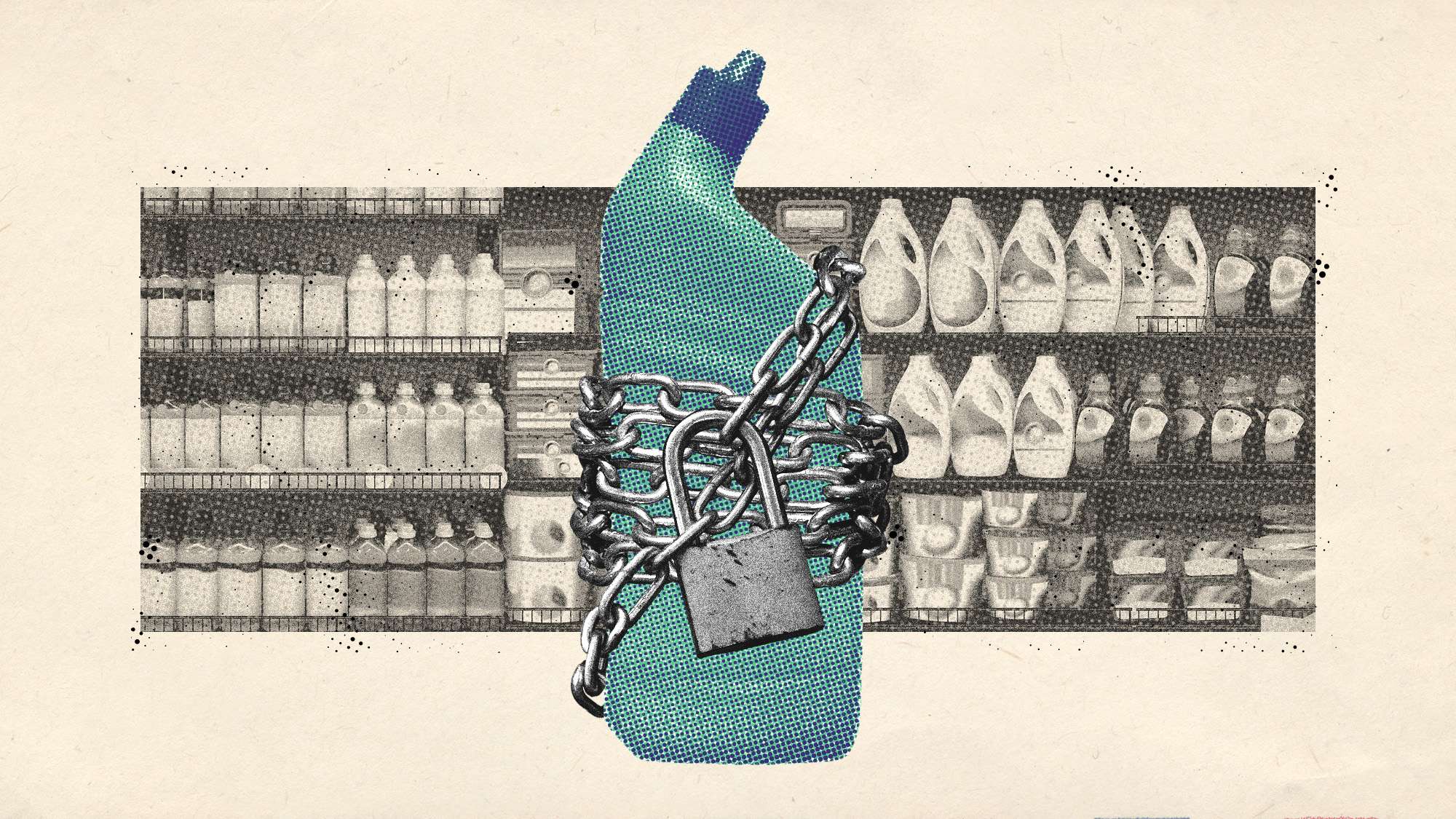The inconvenience store: Why are shops locking up even more merchandise?
You may have noticed a surge in items stowed behind security glass


A free daily email with the biggest news stories of the day – and the best features from TheWeek.com
You are now subscribed
Your newsletter sign-up was successful
Pop into a drugstore to grab some razors or a new tube of mascara and you are likely to find those items trapped behind security glass. There you stand, pressing the call-for-help button and waiting for a cashier to come unlock the case. In an attempt to stop retail theft, big chain stores are locking up more and more of their wares. But customers are not happy about the extended wait times and decreasing ease of scooping up even the cheapest items in a hurry.
How bad is the shoplifting problem?
It used to be that only pricier products like cold medication and electronics got locked up, but now everything from condoms to lotion is similarly stowed. Some research suggests the shoplifting problem these lockups are combatting is overblown. A nonpartisan research organization called The Council on Criminal Justice tracked shoplifting trends in 24 cities from 2019 to the middle of 2023, and found that rates decreased in more than two-thirds of the cities over that time, said The Los Angeles Times. Exceptions were New York and Los Angeles, which both saw increases in shoplifting, defined as "stealing goods valued at less than $950."
However, in 2022, "nearly 70% of retailers reported a rise in organized retail crime … contributing to theft and losses of as much as $69 billion a year," said Forbes, citing statistics from the Retail Industry Leaders Association and the Buy Safe America Coalition. So-called retail gangs were performing "coordinated attacks," targeting products they could "steal in bulk and easily resell online, with some groups netting millions in profits."
The Week
Escape your echo chamber. Get the facts behind the news, plus analysis from multiple perspectives.

Sign up for The Week's Free Newsletters
From our morning news briefing to a weekly Good News Newsletter, get the best of The Week delivered directly to your inbox.
From our morning news briefing to a weekly Good News Newsletter, get the best of The Week delivered directly to your inbox.
There is obviously a discrepancy between the two reports, and that is because retail theft is notoriously difficult to track. "The true severity and scope of the problem" remains a mystery, said the Times. "National chains eagerly point to retail theft as a key drag on profits, but are reticent to publicly discuss internal numbers on shrink — the industry term for theft and other types of loss — or specifics of new anti-theft measures," the outlet added. This problem may be trumped up "by a retail industry happy to pin its problems, which include market forces such as inflation and a shift to online shopping, on stolen merchandise," Charis Kubrin, a professor of criminology at UC Irvine who studies retail theft, told the Times. While some stores lock up lots of merchandise, others do not, Kubrin said, so "it's kind of an uneven distribution." A 2022 Times analysis found a clear bias in the practice: In higher-income areas, fewer items were locked up, "even in places where property crime rates were higher."
How are lock-up efforts going?
The most obvious result of lock-up efforts is a loss of business for brick-and-mortar retailers. Many shoppers now prefer the ease of Amazon delivery to waiting around helplessly for an employee to unlock their merchandise. "Retailers aren't clueless," said Forbes. "They know customers hate finding stuff locked up. It typically results in a 15% to 25% reduction in sales." In this way, the strategy of locking up products, "which is cheaper for [stores] than hiring more staff to keep watch," has been a disappointment, said CNN.
New products are now being born of the apparent need to stop the rise in theft. Security solutions company InVue has seen sales for its smart locks surge 86% year-to-date, after rising 31% last year, said Forbes. Its customers include Lowe's and Best Buy. Walmart "began testing a new type of locked case this year that can be opened by any employee with a smartphone," Forbes added, which eliminates the "need to track down the employee with the right physical key" and is more convenient for customers. Then there is the Freedom Case, another tool that allows customers to unlock products using their cell phones or a store loyalty card, which is reportedly being tested by 26 retailers already, said Joe Budano, the CEO of developer Indyme, to CNN.
While this system may trigger privacy concerns, "consumers have repeatedly shown a willingness to exchange personal information for purchases," said CNN. The customer's phone number will be "used solely for the purpose of accessing the merchandise," Budano said, and the device "also gives customers the option to request an employee open the display without giving any information."
A free daily email with the biggest news stories of the day – and the best features from TheWeek.com
Anya Jaremko-Greenwold has worked as a story editor at The Week since 2024. She previously worked at FLOOD Magazine, Woman's World, First for Women, DGO Magazine and BOMB Magazine. Anya's culture writing has appeared in The Atlantic, Jezebel, Vice and the Los Angeles Review of Books, among others.
-
 Political cartoons for February 15
Political cartoons for February 15Cartoons Sunday's political cartoons include political ventriloquism, Europe in the middle, and more
-
 The broken water companies failing England and Wales
The broken water companies failing England and WalesExplainer With rising bills, deteriorating river health and a lack of investment, regulators face an uphill battle to stabilise the industry
-
 A thrilling foodie city in northern Japan
A thrilling foodie city in northern JapanThe Week Recommends The food scene here is ‘unspoilt’ and ‘fun’
-
 Buffett: The end of a golden era for Berkshire Hathaway
Buffett: The end of a golden era for Berkshire HathawayFeature After 60 years, the Oracle of Omaha retires
-
 Tariffs have American whiskey distillers on the rocks
Tariffs have American whiskey distillers on the rocksIn the Spotlight Jim Beam is the latest brand to feel the pain
-
 TikTok secures deal to remain in US
TikTok secures deal to remain in USSpeed Read ByteDance will form a US version of the popular video-sharing platform
-
 SiriusXM hopes a new Howard Stern deal can turn its fortunes around
SiriusXM hopes a new Howard Stern deal can turn its fortunes aroundThe Explainer The company has been steadily losing subscribers
-
 How will the Warner Bros. bidding war affect the entertainment industry?
How will the Warner Bros. bidding war affect the entertainment industry?Today’s Big Question Both Netflix and Paramount are trying to purchase the company
-
 Texas is trying to become America’s next financial hub
Texas is trying to become America’s next financial hubIn the Spotlight The Lone Star State could soon have three major stock exchanges
-
 US mints final penny after 232-year run
US mints final penny after 232-year runSpeed Read Production of the one-cent coin has ended
-
 How could worsening consumer sentiment affect the economy?
How could worsening consumer sentiment affect the economy?Today’s Big Question Sentiment dropped this month to a near-record low
